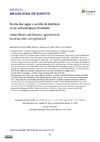Identificador persistente para citar o vincular este elemento:
https://accedacris.ulpgc.es/jspui/handle/10553/72017
| Campo DC | Valor | idioma |
|---|---|---|
| dc.contributor.author | Ceren, Joao Pedro | - |
| dc.contributor.author | Miranda Gonçalves, Ruben | - |
| dc.contributor.author | Moura do Carmo, Valter | - |
| dc.date.accessioned | 2020-05-05T12:41:35Z | - |
| dc.date.available | 2020-05-05T12:41:35Z | - |
| dc.date.issued | 2019 | - |
| dc.identifier.issn | 1807-1228 | - |
| dc.identifier.other | WoS | - |
| dc.identifier.uri | https://accedacris.ulpgc.es/handle/10553/72017 | - |
| dc.description.abstract | Brazilian Anti-Corruption Law (Law No. 12.846 of 2013) has brought interesting mechanisms for improving the fight against corruption. Among these instruments, this article addresses the Leniency Agreement, whose main purpose is an exchange between the Public Power and the legal entity that celebrates it; the State will gain information for better investigation, by dismantling groups and people involved in the corrupt act, while the legal person will be awarded a prize for having been required to provide such information. However, by using game theory, is the leniency agreement, according to how it is in the anti-corruption law, interesting from an economic point of view? Are the expected benefits enough for those who celebrate the leniency agreement? And if not, what element could make it more attractive? In order to face such questions, the deductive methods of research will be used by this paper. It is possible to claim that the leniency agreement, according to game theory, may not be so advantageous for those who celebrate it, if its effects are not communicated between the anticompetition and anti-corruption legislation, for a better use of this institute, the important thing would be an exchange between the new law in defense of competition and the anticorruption law. | - |
| dc.description.abstract | A lei anticorrupção brasileira (lei nº 12.846 de 2013) trouxe mecanismos interessantes para o aprimoramento ao combate da corrupção. Dentre tais instrumentos, o artigo discute o acordo de leniência, que tem como finalidade precípua uma troca entre Poder Público e pessoa jurídica que o celebra; o Estado ganha informações para um melhor proceder nas investigações, desfazendo grupos e os envolvidos no ato corrupto, enquanto a pessoa jurídica ganha um prêmio por ter se sujeitado a fornecer tais informações. Todavia, ao utilizarmos a teoria dos jogos (game theory), o acordo de leniência, conforme se encontra atualmente na lei anticorrupção, é interessante do ponto de vista econômico? Os benefícios previstos para quem celebra o acordo de leniência são suficientes? E em caso negativo, qual elemento poderia contribuir para torná-lo mais atrativo? O método dedutivo de pesquisa pautará este artigo. É possível afirmar que o acordo de leniência conforme a teoria dos jogos pode não ser tão vantajoso para quem o celebra caso seus efeitos não se comuniquem entre a legislação anticoncorrencial e a anticorruptiva, para um melhor uso do instituto, importante seria um intercâmbio entre a nova lei de defesa da concorrência e a lei anticorrupção. | - |
| dc.language | por | - |
| dc.relation.ispartof | Revista Brasileira De Direito | - |
| dc.source | Revista Brasileira De Direito [ISSN 1807-1228],v. 15 (2), p. 55-78, (Mayo-Agosto 2019) | - |
| dc.subject | 5602 Teoría y métodos generales | - |
| dc.subject | 560504 Derecho constitucional | - |
| dc.subject.other | Corruption | - |
| dc.subject.other | Game Theory | - |
| dc.subject.other | Leniency Agreement | - |
| dc.subject.other | Acordo de leniência | - |
| dc.subject.other | Teoria dos jogos | - |
| dc.title | Game theory and leniency agreement in brazilian anti-corruption law | - |
| dc.title.alternative | Teoria dos jogos e acordo de leniência na lei anticorrupção brasileira | - |
| dc.type | info:eu-repo/semantics/Article | - |
| dc.type | Article | - |
| dc.identifier.doi | 10.18256/2238-0604.2019.v15i2.3604 | - |
| dc.identifier.isi | 000516825200003 | - |
| dc.identifier.eissn | 2238-0604 | - |
| dc.description.lastpage | 78 | - |
| dc.identifier.issue | 2 | - |
| dc.description.firstpage | 55 | - |
| dc.relation.volume | 15 | - |
| dc.investigacion | Ciencias Sociales y Jurídicas | - |
| dc.type2 | Artículo | - |
| dc.contributor.daisngid | 35011803 | - |
| dc.contributor.daisngid | 8526274 | - |
| dc.contributor.daisngid | 9701269 | - |
| dc.description.numberofpages | 24 | - |
| dc.utils.revision | Sí | - |
| dc.contributor.wosstandard | WOS:Ceren, JP | - |
| dc.contributor.wosstandard | WOS:Goncalves, RM | - |
| dc.contributor.wosstandard | WOS:do Carmo, VM | - |
| dc.date.coverdate | Mayo-Agosto 2019 | - |
| dc.identifier.ulpgc | Sí | - |
| dc.description.esci | ESCI | - |
| dc.description.erihplus | ERIH PLUS | |
| item.fulltext | Con texto completo | - |
| item.grantfulltext | open | - |
| Colección: | Artículos | |
Citas de WEB OF SCIENCETM
Citations
1
actualizado el 18-ene-2026
Visitas
138
actualizado el 04-may-2024
Descargas
115
actualizado el 04-may-2024
Google ScholarTM
Verifica
Altmetric
Comparte
Exporta metadatos
Los elementos en ULPGC accedaCRIS están protegidos por derechos de autor con todos los derechos reservados, a menos que se indique lo contrario.
